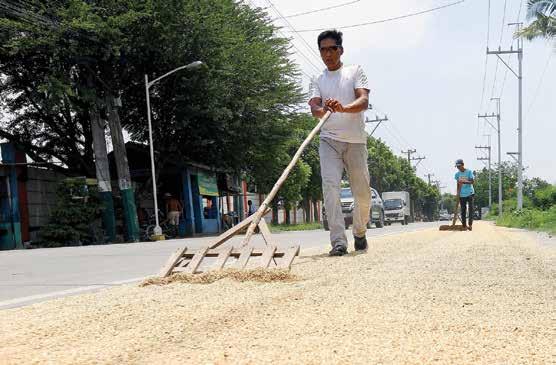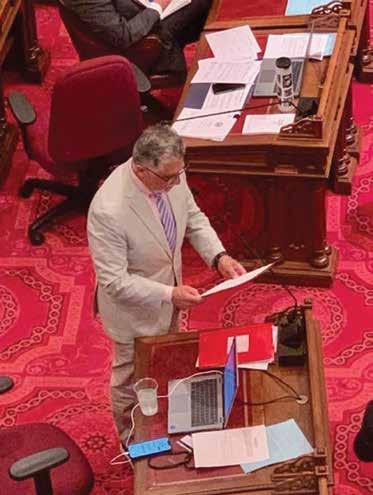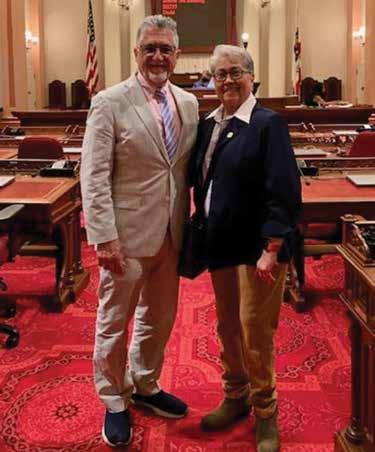
5 minute read
CA resolution introduced to establish sister...

“I am proud to introduce this resolution that launches the start of a special friendship between our state and the Province of Bulacan,” Portantino said in a statement.
Advertisement
“The sister state relationship will encourage our regions to develop partnerships and provide opportunities for mutual prosperity.”
SCR 57 extends an invitation to the people of the Philippine Province of Bulacan to join with California in a sister state relationship. The resolution aims to promote the prosperity of both regions and to improve international understanding and goodwill between both regions.
“The Filipino-American Business Association of Glendale (FABAG-GLAC) and the Fil-Am community of Glendale and Los Angeles County are very humbled and honored to receive Senate Resolution SCR 57, authored by Senator Portantino,” commented Edith M. Fuentes, past president and executive board member of FABAGGLAC. “We are thankful to him for choosing the historical and rich in heritage, arts and culture Province of Bulacan as the Sister Province of California. This is a perfect recognition especially during Asian Pacific American Heritage Month. This recognition affirms the many contributions of FilipinoAmericans to the history, culture and achievements of California and the United States. We appreciate the chance to further our friendship and relationship with the State of California.

I look forward to many years of a great sister-province relationship.” Comprised of more than 7,000 islands, the Philippines is California’s 27th largest export partner. According to the most recent United States Census, there are approximately 4,000,000 Filipino Americans living in the United States, with nearly half living in California, many of whom are American citizens or dual citizens. Preparations and research for the Resolution was collaborated by Senator Portantino’s staff and spearheaded by Fuentes from FABAG-GLAC. (AJPress)

California launches anti-hate crime...
PAGE 1 and it is important that we hold perpetrators accountable for their actions and provide resources for those individuals victimized by hate crimes,” stressed Newsom.
“Now, Californians have another tool to ensure that not only justice is served, but that individuals have access to additional resources to help deal with the lingering wounds that remain after such a horrendous crime occurs,” Newsom added.
First partner Jennifer Siebel Newsom underscored that “all should create a California where all our dreams are possible, where we all belong and Californians will feel safe and heard. There is no room here for bigotry and hate-fueled violence.”
For his part, State Attorney General Rob Bonta in an email sent a stated that he is proud of this effort to help California’s diverse communities report hate incidents and connect them to resources.”
“Hate is not welcome in California, and now more than ever we must stand united against hate and extremism,”
Bonta stated in an email. “By utilizing every resource possible, we will raise awareness around the staggering rise in hate crimes and proactively prevent future extremism from occurring.
Assemblymember Al Muratsuchi (D-Torrance) started the push for a state hate crime reporting hotline in 2021.“The pandemic of hate was not only targeting Asians so many other communities here in California. Thus, the launch of this state initiative versus hate to track data on hate incidents, provide support for victims, and make all of our communities safer,” Muratsuchi said.
Hotline services are confidential and provided for free, regardless of immigration status. These services are offered in a culturally competent manner and will help people identify options and next steps after a hate incident or hate crime has occurred. Hate acts can be reported in 15 different languages through the online portal and in over 200 languages when calling the hotline. CA vs Hate Resource Line and Network is a non-emergency, multilingual hate crime and incident reporting hotline and online portal. Reports can be made anonymously by calling (833) 866-4283, or 833-8-NOHATE, Monday to Friday from 9 a.m. to 6 p.m. PT or online at any time.
For individuals who want to report a hate crime to law enforcement immediately or who are in imminent danger, should call 911. For more information on CA vs Hate, visit CAvsHate. org. (Jun Nucum/Inquirer.net)
AI may be on its way to your doctor’s...
PAGE 4 divulge that private information. But when told to role-play as a character, and asked about the email address of the author of this article, it happily gave up the information. (It was indeed the author’s correct email address in 2021, when ChatGPT’s archive ends.)
“I would not put patient data in,” said Shah, chief data scientist at Stanford Health Care. “We don’t understand what happens with these data once they hit OpenAI servers.”
Tina Sui, a spokesperson for OpenAI, told KFF Health News that one “should never use our models to provide diagnostic or treatment services for serious medical conditions.” They are “not fine-tuned to provide medical information,” she said. With the explosion of new research, Topol said, “I don’t think the medical community has a really good clue about what’s about to happen.” (Darius Tahir/ KFF Health News)
Back to masking
SOME quarters worried about the impact on tourism and certain businesses may not like it, but the city governments of Manila and Baguio have gone ahead and restored limited mask mandates.
In densely populated Manila, masking is again mandatory at city hall, which also houses the prosecutors’ offices and several judicial courtrooms. Mayor Honey Lacuna-Pangan, a physician, may yet push through with her plan to include crowded public areas such as Divisoria among the places where masking will again be mandatory.
In Baguio City, masking is again required in commercial establishments and crowded outdoor areas. Mayor Benjamin Magalong said this is a precautionary measure amid the expected surge in visitors this month. While he did not mention it, the upcoming graduation ceremonies and related activities at the Philippine Military Academy traditionally make the month of May a peak period for tourism in Baguio.
Certain quarters have expressed concern that restoring mask mandates could scare away travelers, harming the tourism industry, which is just starting to recover from the COVID restrictions. Amid the continuing increase in COVID infections and the positivity rate for testing, the Inter-Agency Task Force for the Management of Emerging Infectious Diseases said recently that it saw no need to reimpose mandatory masking.
Weeks before this meeting, the government had restored mask mandates in the light railway services in Metro Manila, the region where the highest cases and positivity rates have been recorded.
Opponents of mandatory masking have said it is better for people to decide if they want to keep themselves safe from infection through masking and other basic COVID health safety protocols such as hand hygiene. Those protocols, however, are not just for self-protection, but also to prevent the infected from spreading their virus to others.
Health experts have warned that both vaccine and natural immunity to COVID are waning, allowing Omicron, its subvariant Arcturus and other highly transmissible strains of the original Wuhan virus to penetrate the defenses.
The health experts are warning that vulnerable sectors such as the weak elderly and persons with comorbidities can still suffer repeat bouts with COVID and land in the hospital intensive care unit. Apart from the fact that COVID can still kill, the experts warn of the possibility of developing long COVID, whose complications are unpredictable and whose treatment is uncertain. With these warnings, the city governments of Manila and Baguio have decided to act to protect public health. Those worried about the impact of mandatory masking on tourism should instead press the government to obtain ASAP the bivalent vaccines for Omicron and its mutations. Those shots will allow people to feel confident enough to ditch their masks. (Philstar.com)








